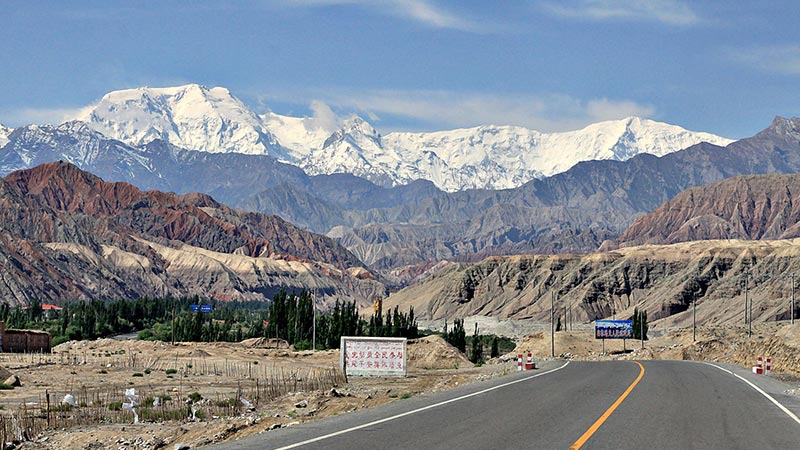
“…Geography not just shapes history but also destiny.” – Tim Marshall
By Shakir Ali 27 November 2020
This quote shows that the geopolitical determinants are the major factors that determined the fortune of a region in international politics. Gilgit Baltistan geopolitics came into the limelight politics during the great game between the Soviet Union and the British in the nineteenth century. But in the twentieth and twenty-one century, Gilgit Baltistan is emerging as the geo-economics center of the world and the CPEC has the major instrument to connect with Central Asia, the Middle East, and Atlantic power. By focusing on the geopolitics of Gilgit Baltistan, this paper will cover the journey of this region from a geostrategic center to a geo-economics center in contemporary politics.
Geographically, Gilgit Baltistan is acting as a crossroad between central, south, and East Asia. In ancient times, as a result of stable supply lines, this region was used by caravans for moving from central Asia and China to Greek city-states -for the sake of security and protection.it is located between Pakistan, Afghanistan, India, and both Kashmir (Pakistan and India).
In the 19th century, the British were a dominant power in sea routes. The Middle East and sub-continent India were the British colonies and china were also under British influence. However, at that time the expansionist policy of Russia was a major threat to the British hegemonic role in the world. Both the geopolitical power was competing with each other to take control over navigable water, world trade routes and land resources
Although based on the geopolitical importance of Gilgit Baltistan, Russia wants to enter into the Arabian Sea through Gilgit and Chitral. The British being colonial power wants the safety and security of these routes, which makes it possible for them to exploit resources in their colonial states. After many hard power projections, both the Geopolitical powers reached an agreement in which they have decided to use Gilgit and Chitral as a buffer between the former Atlantic power and the Bear. This geostrategic competition is known as the “Great Game” which started in the early 20th century and ended in the early 20th century due to the beginning of WW1. This Great Game was based on geopolitical needs.
The changing paradigms of geopolitics have raised GB’s importance in regional and global considerations. In contemporary politics; Gilgit Baltistan is again emerging in Global politics as the Geo-economic hub of the world. The geopolitical significance of Gilgit Baltistan has increased by CPEC. CPEC is a geo-economics rather than geopolitics. Without GB, Gwader has no meaning to china
CPEC is the framework of regional connectivity. It was practically executed by PRC President Xi Jinping in April 2015. It was a flagship project of BRI and president Xi termed it as “project of the century”. Under this CPEC umbrella, 62 billion US dollars are being invested to improve the supply chain connectivity. CPEC is a part of a grand project that creates interdependence not only between Pakistan and China but also among other regional countries.
For China, CPEC enables China to reach its access to markets in Asia, Africa, and Europe, and beyond while linking Gwadar to Xinjiang through Gilgit. Besides, Xinjiang is only 2500 kilometers from the Arabian coast, but 4500 kilometers from the Pacific coast. CPEC will link China with Europe through Central Asia and the Maritime Silk Road to ensure a safe passage of China’s shipping through the Indian Ocean and the South China Sea. Access to the Indian Ocean via Gwadar will enable China’s naval warships and merchant ships to bypass Malacca Strait and overcome its “Malacca Dilemma”. CPEC will bridge China with nearly half of the population of the world.
For Pakistan, CPEC is a game-changer. It is the hope to get out of economic distress. At the geo-economic level, CPEC is not only acting as an inevitable lifeline not only for Pakistan but for the CARs and Afghanistan as well. The region is likely to become progressively more interconnected and interdependent as the CPEC evolves. GB could be linked to Tajikistan and Kyrgyzstan through Xinjiang, providing a critical alternate route to the Makran Coast for the CARs. GB will also be the conduit for all trade convoys, oil and gas pipelines that move into Xinjiang. Eventually, a rail link between Pakistan and Xinjiang may also materialize. GB’s vastly improved road and motorway infrastructure will attract direct foreign investments in tourism and boost its economy. GB’s vast water resources and landscape are already helping kick start gigantic projects like the Diamer-Bhasha Dam and enabling other dams and hydel power projects in AJ&K and elsewhere too.
There is a massive convergence of national interests of Pakistan and China in GB. It is thus imperative that GB remains secure, stable, peaceful, progressive, and connected to the rest of the country, China, and the region at all times. It has to be secured against all external and internal threats, particularly those sponsored by India and other hostile agencies. Rabid sectarianism, ethnicity, and terrorism must be pre-empted and ruthlessly exterminated. It must also be secured against cyber and other attacks in the electromagnetic spectrum. It is undoubtedly the Centre of gravity of the CPEC; the GB-Gwadar link being the most crucial one. Peace and conducive environments must prevail at both ends of this link and in between. Without one end the other loses all meaning. Pakistan must further integrate GB into its political spectrum and give it an unequivocal and unambiguous Pakistani identity; without prejudice to its stand on the resolution of the Kashmir issue under the relevant UNSC resolutions.
